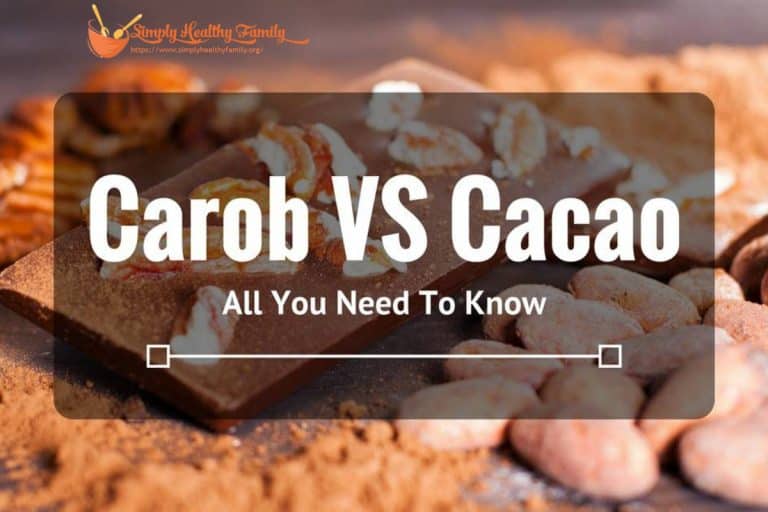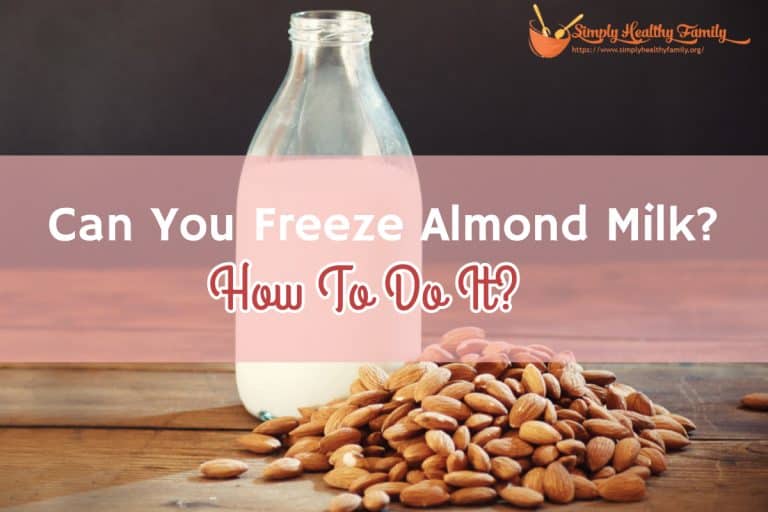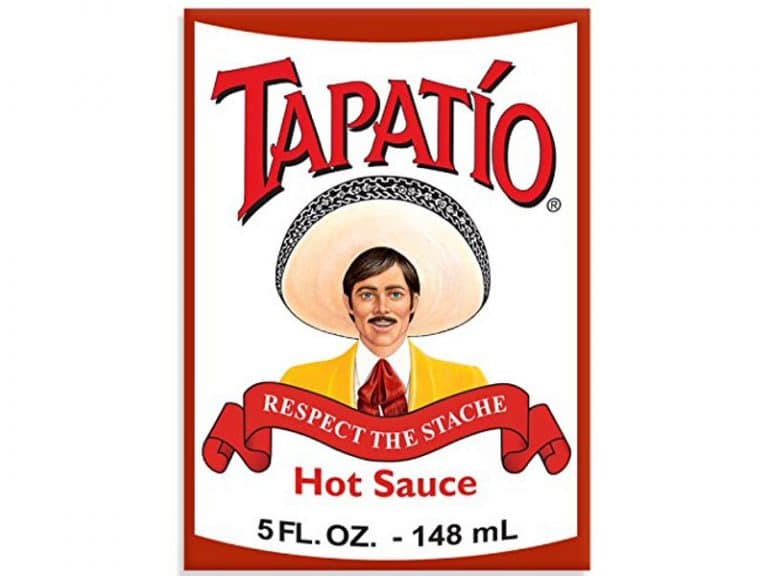Does Balsamic Vinegar Go Bad?
Balsamic vinegar is a concentrated condiment with a powerful punch. The product is usually used in small quantities in recipes. Since a bottle of expensive balsamic vinegar can’t be used quickly, many cooks wonder whether older balsamic vinegar is still usable.
Balsamic vinegar doesn’t go bad if it’s stored correctly and can generally be used long after its expiration date. The acidic nature of the vinegar acts as a preservative, preventing the vinegar from spoiling. The quality, however, can degrade over time.
What Is Balsamic Vinegar?
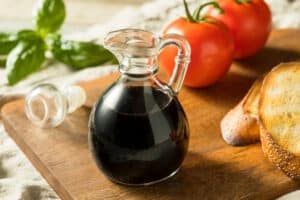
Balsamic vinegar is a highly concentrated vinegar with a brown color and a solid tart flavor blended with a subtle hint of sweetness. Famous for the unique taste that it lends to foods, balsamic vinegar is used in salad dressings, sauces, marinades, and cooked foods like roasted meats and stews.
This type of vinegar is made from unfermented grape juice and aged in wooden barrels. The longer the aging period, the better the quality of balsamic vinegar. Expensive, good-quality balsamic vinegar is often aged for up to 25 years.
Balsamic vinegar originates from Italy, specifically the regions of Modena and Reggio Emilia.
How Long Does Balsamic Vinegar Last?
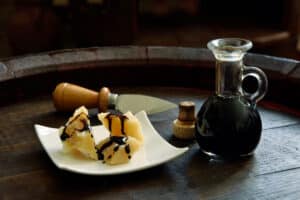
There are two main types of balsamic vinegar — traditional and modern commercial. Traditional balsamic vinegar has a longer shelf life than commercial.
Traditional Balsamic Vinegar (Aceto Balsamico Tradizionale)
The highest grade of Balsamic Vinegar – Classic traditional balsamic vinegar doesn’t go bad. This type of vinegar has been aged for many years, which purifies the ingredients (minimum of 12 years!). The acid in balsamic vinegar prevents bacteria from multiplying, making it safe to use for 20 years or more, depending on how it’s stored.
Traditional balsamic vinegar is the best quality and best-tasting variety available. Good quality balsamic vinegar usually doesn’t have a set shelf life.
Because a bottle of good quality balsamic vinegar is expensive, store the vinegar correctly so that you can use it all.
Balsamic Vinegar of Modena (Aceto Balsamico di Modena)
Balsamic Vinegar of Modena has been aged for a few months and up to 3 years and has a lower quality and shorter shelf life than traditional balsamic vinegar.
Commercial balsamic vinegar usually has a best-by date of three to four years after its production date. Provided modern commercial balsamic vinegar is stored correctly, it’s safe to use for up to a year after its best-by date, giving it a five-year shelf life.
How to Store Balsamic Vinegar
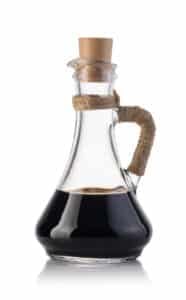
Although balsamic vinegar’s shelf life is indefinite, storing it incorrectly can cause it to deteriorate and possibly spoil. Store balsamic vinegar in a cool, dark cupboard or pantry with the cap firmly secured. After opening the bottle, make sure always to seal it tightly when not in use. If the bottle is left unsealed, the vinegar can oxidize, which may lead to flavor changes.
These are the elements that will cause the vinegar to deteriorate:
- Light — Exposure to direct light or direct sunlight causes a reaction in the natural chemicals in the vinegar, making the vinegar lose the intensity of its flavor. When buying balsamic vinegar, choose a brand in a dark bottle rather than a clear glass bottle, and store the vinegar in a dark cupboard or pantry to minimize light exposure.
- Heat — Multiplication of bacteria is possible in vinegar stored at temperatures above 80°F. Avoid storing balsamic vinegar on the kitchen counter or in a cupboard beside the oven. Store the vinegar in a cool cupboard with a temperature between 60 and 80°F
- Air — Exposure to air allows bacteria to enter the balsamic vinegar and possibly contaminate it. Ensure that the bottle is tightly sealed with the cap to prevent contamination. Leaving the bottle open also causes the vinegar to evaporate.
While there’s no need to refrigerate balsamic vinegar to preserve it, sometimes it’s best when used cold, as when mixed with olive oil and poured over a salad. Storing balsamic vinegar in the refrigerator to keep it cold won’t affect its quality.
How to Tell if Balsamic Vinegar Is Bad
There are numerous ways to tell if balsamic vinegar has spoiled:
- Smell the vinegar — Balsamic vinegar usually has a sharp, pungent, slightly sweet aroma. Spoiled balsamic vinegar has a rancid, off-putting odor. It might lose some of its aroma, but the flavor can mellow out a bit.
- Examine vinegar’s color — Balsamic vinegar should be amber to light brown. If your balsamic vinegar has turned dark brown or black, it has gone bad. Cloudy sediment can form at the bottom of the bottom, or a “mother” may develop. These are normal processes and don’t mean the vinegar is terrible – in fact, the “mother” (a substance composed of natural cellulose and acetic acid bacteria) can be used to make new vinegar.
- Taste the vinegar — Balsamic vinegar that has lost its flavor or tastes unpleasantly bitter has gone bad. While nobody should consume a product that is potentially spoiled, tasting balsamic vinegar by putting a minute drop on the tip of your finger won’t cause harm
FAQs About Balsamic Vinegar
These are common questions that people ask about balsamic vinegar:
What Does it Mean if Balsamic Vinegar Has Sediment?
A thin layer of sediment in a bottle of balsamic vinegar is caused by cellulose, a complex carbohydrate in the vinegar, and doesn’t affect the quality of the vinegar. Strain the vinegar through a piece of coffee filter paper, if you prefer, to remove the sediment.
However, if the sediment becomes thick and starts to grow, you should discard the vinegar because thick sediment is a sign that bacteria are multiplying and the vinegar is no longer safe to use.
What Are the Black or Dark Flecks in Balsamic Vinegar?
The black or dark flecks sometimes seen floating in balsamic vinegar are caused by the natural bacteria present in the vinegar and are harmless. However, if the black flecks become large, spongy masses in the liquid, the vinegar has spoiled and should be discarded.
Can I Keep Using My Expired Balsamic Vinegar?
Yes, you can use expired balsamic vinegar. The expiration date is given as a guide only and isn’t a strict determination of how long the vinegar will be safe to use.
Using balsamic vinegar long after the expiration date is safe, provided the vinegar has been stored correctly and doesn’t display any signs of spoiling.
Can I Freeze Balsamic Vinegar?
Yes, you can freeze balsamic vinegar. All kinds of vinegar, including apple cider vinegar, balsamic vinegar, and black vinegar, freeze at 28°F. However, there’s no need to freeze vinegar because balsamic vinegar lasts indefinitely in a dark cupboard, and freezing it doesn’t prolong its lifespan.
If you want to freeze balsamic vinegar, pour it into an airtight, freezer-safe container. Leave at least 1 inch above the surface to leave space for expansion as the vinegar freezes. Avoid freezing balsamic vinegar in a glass bottle because the glass may crack in the freezer.
Conclusion
Balsamic vinegar has an indefinite shelf life and doesn’t go bad if it’s stored properly. Take full advantage of the lifespan of balsamic vinegar by closing the bottle securely and keeping the vinegar in a cool, dark place. Don’t worry about small amounts of sediment or dark spots in balsamic vinegar. The vinegar is still safe to use.

